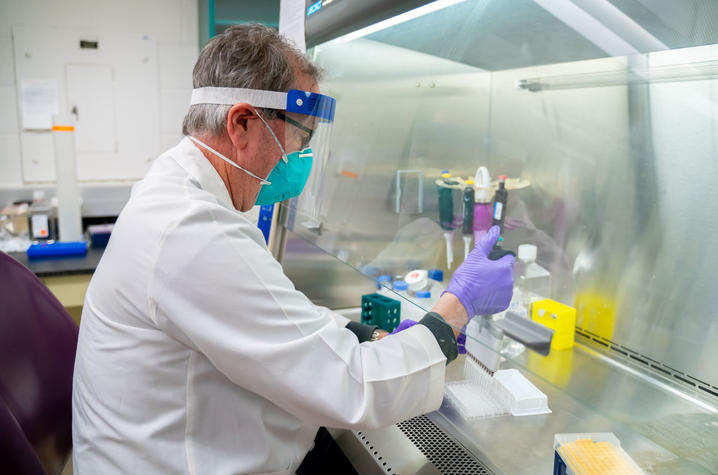UK Researchers Will Lead Study of COVID-19 Immunity
LEXINGTON, Ky. (May 11, 2020) — University of Kentucky researchers have launched antibody testing that will help to understand what immunity to COVID-19 really means. Several research labs and core facilities within UK’s Colleges of Medicine and Pharmacy will be testing the antibodies of recovered COVID-19 patients for a study to see how long they protect against reinfection.
The research is part of UK’s COVID-19 Unified Research Experts (CURE) Alliance team, which is uniting UK medical researchers across disciplines in the fight against the novel coronavirus. Supported by the College of Medicine and Vice President of Research Lisa Cassis, CURE’s focus is to advise COVID-19 patient care and clinical trials based on emerging research and potential treatment options.
As Kentuckians head back to work and school, antibody testing will likely play an important role in determining who has already contracted COVID-19 and developed immunities that will prevent them from reinfection of SARS-CoV-2, the virus strain that causes the disease.
While UK HealthCare is currently ramping up antibody testing in a clinical diagnostic setting for this purpose, the CURE team’s research will be answering very important questions about COVID-19 immunity: How strong is it and how long will it last?
“The Alliance is performing critical research that will help us understand how long antibodies will protect recovered patients from being reinfected by SARS-CoV-2 in the future,” said Don Cohen, director of UK’s Flow Cytometry and Immune Monitoring Core Facility (FCIM). “The answers will be important for our state officials to determine how to handle this virus moving forward.”
Cohen and Jerry Woodward, both faculty in the College of Medicine’s department of Microbiology, Immunology and Molecular Genetics, run the FCIM lab, which is one of the university’s core research facilities. FCIM has state-of-the-art equipment used for analysis of immune cells that is available to the UK research community.
Thanks to early coordination by Woodward, UK was among the first universities in the U.S. to create COVID-19 antibody tests using the virus’ DNA to make the necessary protein.
When developing an antibody test, also known as an “ELISA assay,” researchers must produce a part of the virus that antibodies in the patient's blood will recognize. For SARS-CoV-2 and other coronaviruses, it’s the spike protein – the part of the virus that binds to cells.
In March, Woodward was able to obtain the DNA vector necessary to produce the SARS-CoV-2 spike protein from the lab of Florian Krammer with the Icahn School of Medicine at Mount Sinai in New York. Then a team in UK’s biochemistry department working in the UK Protein Core – including Matthew Gentry, Craig Vander Kooi, Louis Hersh and Martin Chow – produced those proteins from the DNA vector, allowing UK labs to get their own tests up and running quickly.
In addition to the FCIM test, assays were developed in the labs of Vincent Venditto in the College of Pharmacy and Jennifer Moylan with UK’s Center for Clinical and Translational Science (CCTS). The labs obtained blood samples from COVID-19 patients and normal healthy controls from multiple UK sources including the CCTS Biobank and the Markey Cancer Center Biospecimen Core.
Woodward says the Biobank samples were particularly important because they provided the team with samples of serum collected before the COVID-19 outbreak began. This allowed them to determine the “false positive” detection rate of the tests.
“The ELISA assays developed by all three groups accurately identify the antibodies in blood samples donated from recovered COVID-19 patients, but no antibodies were detected in blood samples from pre-COVID-19 patients,” said Woodward. “Importantly, these assays are more specific and accurate than many rapid antibody tests now being used in the U.S.”
The team is now in discussion with some of the clinical researchers at UK to develop clinical trials that will follow immunity to COVID-19 in a cohort of patients. Blood samples from patients with positive antibody tests will be analyzed in FCIM’s immune monitoring lab, which typically provides services that examine aspects of patient immune responses for UK clinical trials.
“We’ll establish the patients’ antibody levels now, and then continue to test them over a period of time,” said Woodward. “If any patients get reinfected that will give us an idea of how long the antibodies provide protection.”
The team also plans to use the labs’ testing capabilities to estimate the prevalence of individuals with antibodies in the community. By testing a subset of the population, they can determine who has already contracted the virus and developed immunity, even if they never had symptoms.
Through the CURE Alliance and other ongoing critical research across campus, UK continues to have a significant impact on the fight against COVID-19 in Kentucky and beyond.
“Because of the coordinated team efforts by multiple UK investigators, we’ve been able to get everything up and running in just weeks, which is incredibly fast,” said Woodward. “Researchers who are top experts in their fields are working together across disciplines to answer important questions and develop solutions as we fight this pandemic.”
